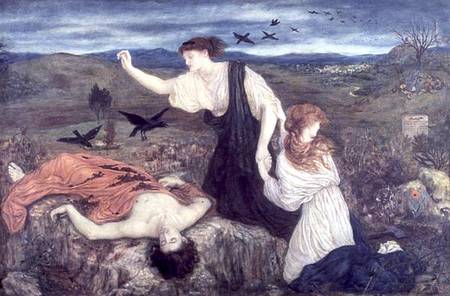 |
| Marie Stillman - Antigone |
... Summarising it like that makes it sound incredibly far-fetched. But the way the play feels, is pure heart-breaking emotion. Creon is obviously too hard on his own kin and makes the mistake of following the law to the letter. But isn't that what the law is there for? To be followed absolutely, with no exceptions, otherwise, wouldn't everyone be able to plead an exception?
Creon: I will not make myself a liar to my people. He who does his duty in his own household will be found righteous in the state also. [658-660].
Antigone, above all, raises the issue of divine law versus secular law. She obeys the laws of the gods, who require that both brothers are buried with equal rites by the next of kin. So surely, in a time when divine law judged mortal law, she is not culpable? Creon has created a Catch-22 for himself by proclaiming death for anyone who interferes, only to find that it is a member of his own family.
Antigone: ... That a mortal could override the unwritten and unfailing statues of heaven for their life is not of today or yesterday, but from all time, and no man knows when they were first put forth. [450-458].
To put this in context, Athenian tragedy, as a genre, was intended to question morality. It was not necessarily a reflection of real life, but was meant to pose a question, a "what would you do if ..." situation. The play itself was written c.442BC in Athens. This was the time of the 'radical democracy', when Athens was at war with Sparta, encountering the public burial of war dead and justifying the polis' democratic position, combining both the written laws of the constitution and the unwritten laws that were divine, moral or assumed.
But as well as all that, to me, it really will always be a gorgeous, tragic and beautiful play.
 |
| Attic Red Figure, Antigone is brought before Creon c.490BC (?) Looks like a krater ... |
No comments:
Post a Comment